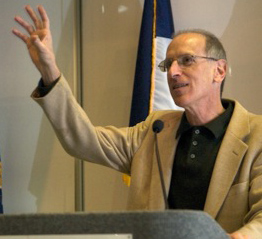
Nearly half of all college students attend community colleges—“institutions that keep alive the American promise of economic opportunity”—writes Randy Cohen in his September 28, New York Times Magazine column, “The Ethicist.” And over 21,000 of those individuals attend BMCC.
If you’re looking to make a donation to a college, you might want to consider Cohen’s advice, that more good is done by donating to a community college like BMCC—where students’ ability to attend is directly affected by funding and its impact on tuition and scholarships—than to a school like Harvard, where the endowment exceeds $26 billion, the largest of any American university.
Who needs your donation dollars most?
“Consider the students served by two sorts of schools,” writes Cohen. “An applicant who falls just shy of getting into Harvard is likely to go elsewhere … But for many other students, it is community college or nothing.”
At BMCC, 78 percent of students come from households with incomes of $25,000 or less, and 80 percent work while going to school. Even so, according to the U.S. Department of Education, BMCC ranks number one in awarding degrees to minority students, nationwide.
Clearly, these community college students are motivated to overcome the obstacles they encounter. In fact, community colleges in general, have historically been the economic stepping stone of choice, for many first-generation students.
Investing in community colleges: Obama sets the example
With last summer’s unveiling of the American Graduation Initiative—a 10-year, $12 billion plan to invest in community colleges—Obama emphasized the crucial economic role community colleges play, because “jobs requiring at least an associate degree are projected to grow twice as fast as jobs requiring no college experience” in coming years.
BMCC’s future alumni will be among the five million additional community-college graduates the president’s Initiative hopes to create by 2020—a goal made more realistic by private donations to the schools they attend.
Don’t make the ‘rich schools richer’
Often, people who attain an associate’s degree continue their education—enabled by the higher income a two-year degree provides. Still, they are not assured a secure socio-economic level for many years to come—assuming other factors, such as family needs and regional layoffs, do not get in the way.
This is a very different scenario from that of students in the Harvard Business School, who Cohen reports earning a median base salary—upon graduation—of $115,000.
But, as Cohen says, “There are many kinds of good to be done in the world.” If a person wants to donate to an already well-endowed school, he suggests splitting the money between that school and one that is more in need.
“Under the current circumstances,” he says, “the more honorable course is to write that check to a community college or a historically black college or a small Catholic college or other modest institution that genuinely and profoundly transforms the lives of its graduates.”

